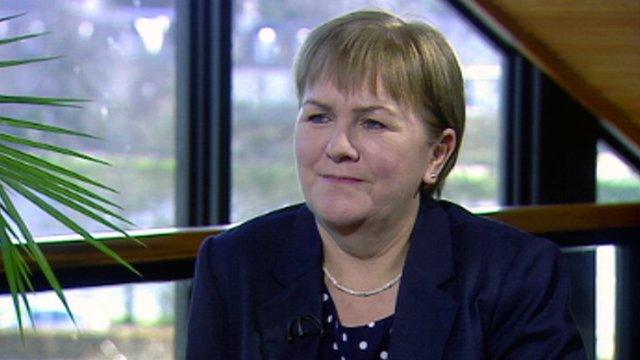Work in progress
- Published
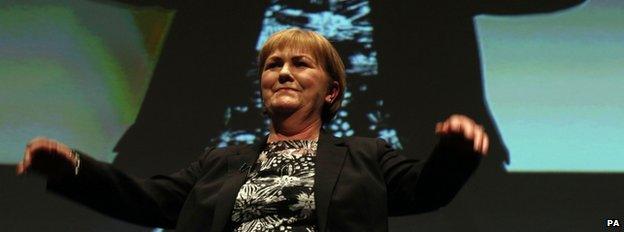
Labour's Johann Lamont told her story - the Glasgwegian, the politician, mother and former teacher
First things first. This was a good speech by Johann Lamont, ecstatically received in the conference hall. Delegates scrambled to stand at the close, applauding furiously, without the lead from the platform which is occasionally required with less favoured oratory.
It was personal and passionate with sound applause lines and occasional moments of dry humour. There was the occasional policy offer such as the proposals on community ownership.
Mostly, however, the speech was designed to set a political environment. Spreading out the canvas, if you like, with the details to be coloured in later. Which, of course, means challenges to come.
In setting the environment, Johann Lamont began by describing herself; the Glaswegian with an island inheritance, the teacher, the mother. This autobiographical section was designed to underpin her emphasis on social justice and her prioritisation of education.
Secondly, in that environment, she reflected back upon her September speech in which she had questioned the value of universal benefits in a context where the genuinely needy were left short.
She attempted to explain that, perhaps even slightly expiate it. Free bus passes, she argued, had limited value if some areas were bereft of buses. Free personal care was just a slogan if carers were so harassed that they had no time to spend with people.
Both points drew prolonged applause. The question lingering, of course, is whether Scotland will still be applauding when Ms Lamont gets round to spelling out her alternative in these and other areas.
To be entirely fair, we are still some way off from the need to draft manifestos for the next Holyrood elections, due in 2016. But, equally reasonably, Ms Lamont's SNP opponents will scarcely sit quietly and take her attacks upon them without demanding answers from her in return.
Politics for a purpose
Similarly, there is uncertainty over Labour's emerging constitutional offer as an alternative to independence. One prospectus features in the interim report of the party's Commission, set up by the leader. That suggests, inter alia, the full devolution of income tax to Holyrood.
Cue contention. Rather a lot of it. See yesterday's posting for the underlying causes of controversy. Ms Lamont set out to address these, in specific fashion.
Firstly, she attempted to placate fretting MPs. There was, she said, absolutely no reason why there should be a reduction in the number of MPs from Scotland in the light of a reduced Scottish remit at Westminster (should more tax powers be devolved.)
Secondly, she tackled the concern advanced by unions and others, that this had to be politics for a purpose. Tax powers would be devolved if they improved the prospect of Scotland enhancing social justice. Otherwise, not.
It was a well constructed section, dealing with the chat behind the scenes in an open speech. But, of course, it still leaves considerable uncertainty - at this stage - as to what Labour's offer might be.
Once again, Labour will argue, with some justice, that this is driven by the electoral calendar, that they have time to consult and decide before the referendum. Once again, Labour's opponents will be entitled to challenge the party on detail.
Catching up with the chat around conference is intriguing. The more subtle Labour thinkers know they have to get this right. They know it is not sufficient to argue that Labour's agenda lies elsewhere.
The party lost - and lost badly - in 2011. That is why there is to be a referendum - and mumping won't make it go away.
The more subtle Labour strategists believe the party must sound less curmudgeonly and more positive about Scotland's prospects. As one put it to me, Just Saying No, loudly, to independence risks Labour sounding like the Ulster Unionists of Scotland.
People decide
Which means reclaiming the constitutional agenda instead of deriding it. Which means examining, seriously, the prospects for further powers. Which means attempting, thereby, to assemble a clear majority for sustaining a reformed Union.
I opened by saying that this was a personal speech by Johann Lamont. It also closed with a personal attack upon Alex Salmond, arguing that his predilections were different from those of the Scottish people. Indeed, in a "courageous" phrase (c. "Yes Minister"), she said that the referendum would prove to be "Scotland versus Salmond".
As an interested viewer, Mr Salmond might just be permitted one of his trademark wry grins at that one, given the overall majority he won from the Scottish people just a short time ago. Perhaps he might also remind Labour which party was his principal opponent in that contest.
Indeed, I made precisely those points to one or two Labour folk here in Inverness. Ah, just you wait, they said. Labour will reclaim a sense of Scottishness alongside a sense of social justice - and independence will be rejected.
However, the political and electoral contests are characterised, it is, as ever, the people who will decide.
- Published20 April 2013
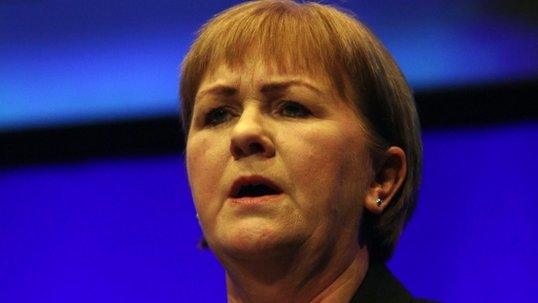
- Published18 April 2013
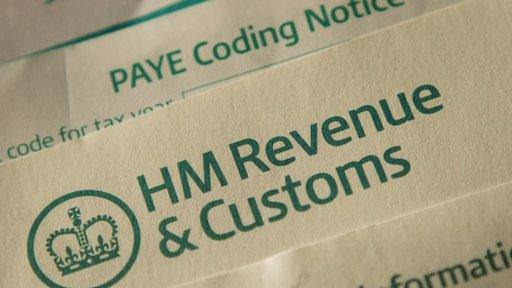
- Published20 April 2013
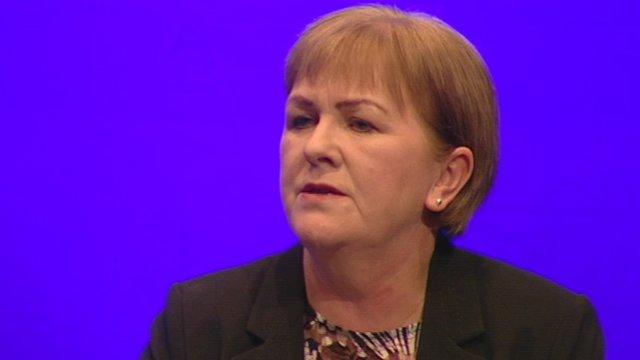
- Published19 April 2013

- Published19 April 2013
